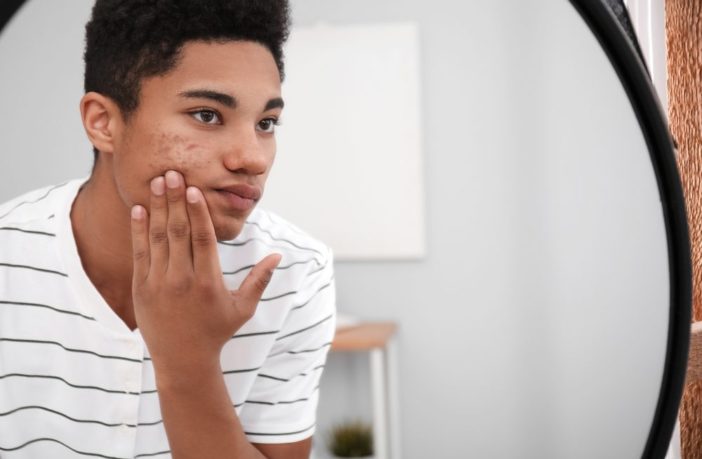Photo credit: Shutterstock.com / Pixel-Shot
Acne is a skin condition that plagues millions of people around the world, irrespective of their age, gender, or race. Yet, when it comes to addressing acne in the Black community, there’s a fascinating link that often goes overlooked – water intake. The significance of hydration in managing acne cannot be overstated, especially for Black men and women. In this article, we’ll delve into the unexpected connection between water consumption and acne among Black individuals, explore practical tips and the potential benefits for clearer skin.
The Skin and Hydration
Your skin is your body’s largest organ, and it plays a vital role in protecting you from external threats. Proper hydration is key to maintaining skin health. When your body is well-hydrated, your skin is more likely to remain soft, supple, and resilient. On the flip side, dehydration can lead to dryness, flakiness, and an increased likelihood of acne breakouts.
For Black men and women, hydration is crucial because their skin has unique characteristics. Black skin typically contains more melanin, which provides natural protection against the sun’s harmful UV rays. However, this same melanin-rich skin can be more prone to specific skincare concerns, such as hyperpigmentation and, yes, acne.
Hyperpigmentation, often called dark spots or acne scars, is a common issue for individuals with darker skin tones. When acne lesions heal, they can leave behind dark marks that take a long time to fade. Adequate hydration can help speed up the healing process and reduce the likelihood of these marks developing in the first place.
How Dehydration Can Aggravate Acne?
Dehydration can exacerbate acne in several ways. Here’s a breakdown of the mechanisms behind this connection:
Excess Oil Production: When the body is dehydrated, it tries to compensate by producing more oil. This excess oil, known as sebum, can clog pores and lead to acne breakouts.
Inflammation: As mentioned earlier, dehydration can lead to low-grade inflammation. Inflammation is a driving force behind many acne breakouts, making it a significant concern for those trying to manage their skin condition.
Slow Skin Healing: Dehydrated skin heals more slowly. This means that any existing acne lesions will take longer to resolve, and new breakouts might occur before the old ones have a chance to heal fully.
Practical Tips for Maintaining Hydration and Clear Skin
Now that we understand the link between water intake and acne in Black men and women, it’s time to discuss practical steps to ensure optimal hydration and clearer skin:
Drink Enough Water: The standard recommendation is to drink at least eight 8-ounce glasses of water a day. However, your individual needs may vary depending on factors like activity level and climate. Pay attention to your body’s signals, such as thirst, to gauge your water intake.
Incorporate Hydrating Foods: Some foods can contribute to your hydration levels. Water-rich fruits and vegetables, like watermelon, cucumbers, and oranges, can help keep you hydrated.
Limit Caffeine and Alcohol: Both caffeine and alcohol can be dehydrating, so try to consume them in moderation. If you do indulge, be sure to balance it with extra water.
Use a Humidifier: Especially in dry or cold climates, a humidifier in your home can help maintain skin hydration.
Moisturize Your Skin: A good moisturizer can help lock in moisture and prevent water loss from your skin. Look for products with hydrating ingredients like hyaluronic acid.
Avoid Harsh Cleansers: Cleansing is essential, but using harsh or stripping cleansers can disrupt your skin’s natural moisture barrier. Opt for gentle, hydrating cleansers to maintain skin health.
Consult a Dermatologist: If you have persistent acne, consulting a dermatologist is advisable. They can help you determine the best skincare routine and acne treatments for your specific needs.
Protect Your Skin from the Sun: Excessive sun exposure can lead to further skin dehydration. Use sunscreen to protect your skin and prevent hyperpigmentation.
The surprising connection between water intake and acne in Black men and women highlights the importance of hydration for skin health. Dehydration can exacerbate acne by increasing oil production, causing inflammation, and delaying the healing process. To unlock the clear skin secret, it’s crucial to maintain proper hydration through drinking enough water, using hydrating skincare products, and adopting a balanced lifestyle. By following these tips and staying well-hydrated, Black men and women can take a significant step toward achieving healthier, clearer skin, while also reaping numerous other health benefits.



